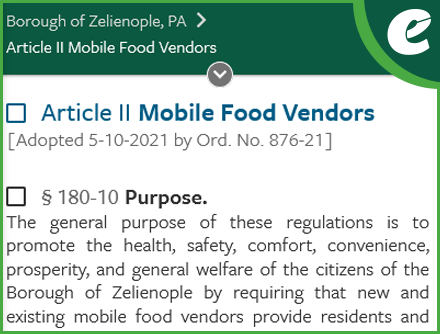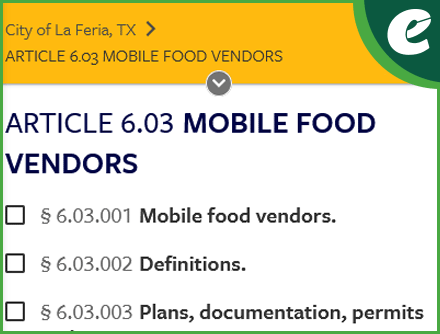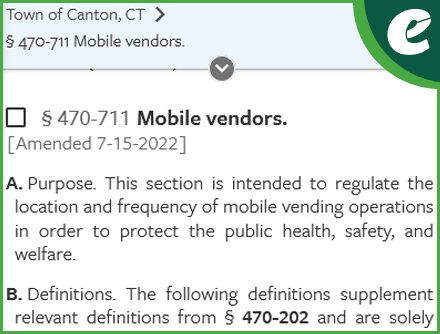From city blocks to small-town festivals, mobile food vendors are spicing up the American culinary scene. With over 50,000 food trucks operating nationwide, this sector is becoming a powerful force in local economies. For municipalities, mobile vendors present a golden opportunity to boost entrepreneurship, activate public spaces, and address food access—if local ordinances are designed to support them.
Brains, buns, and benefits: What mobile vendors bring to communities
Mobile food vending offers a lower-cost way for aspiring chefs and business owners to test their ideas without the high overhead of a brick-and-mortar restaurant. In Los Angeles, for example, many street vendors have started by selling tamales, tacos, or fruit from carts before eventually scaling into full food trucks or storefronts. A 2022 L.A. Times editorial estimated 10,000 street vendors operate in the city alone, often serving as vital cultural and economic contributors.
View sample mobile food vendors legislation >
Filling food gaps
According to Feeding America, “food insecurity exists in every county and congressional district in the U.S., though the prevalence of food insecurity varies significantly across populations and places.” In New York City, mobile produce vendors like Green Carts have helped improve access to fruits and vegetables in areas classified as food deserts. In Texas, the City of Austin has seen a boom in mobile vendors offering everything from vegan soul food to halal Tex-Mex, which has brought diversified access to affordable meals in neighborhoods where grocery stores or restaurants may be scarce.
Activating public spaces
Many communities nationwide have developed programs called “food truck rodeos or rallies,” where vendors help turn parks, plazas, and waterfronts into lively, safe, and social spaces. The City of Santa Ana, CA, for instance, has a “Summer in the Park” program that brings vendors into rotating park locations alongside concerts and outdoor movies, creating opportunities for local engagement and economic activity.
Friendly fuel: How municipalities can support vendors
Streamlined Permitting
- In New York City, recent reforms have aimed to simplify and digitize the mobile food vendor permit process, though demand still far exceeds supply.
- Similarly, San Diego, CA, updated its regulations in 2022 to streamline location approvals and reduce red tape for vendors operating near beaches and high-traffic areas.
- Austin, TX, has also taken steps to consolidate health and fire inspections, allowing mobile food units to submit one application through a central system. This reduces confusion and speeds up approvals—a best practice more cities are adopting.
Supportive Infrastructure
- In California, the nonprofit Inclusive Action for the City has helped vendors access microloans, compliant carts, and advocacy resources.
- Los Angeles, CA, has also developed a “Sidewalk Vendor Task Force” to coordinate between public health, planning, and enforcement departments in order to create clearer communication for all.
- Milwaukee, WI, launched a pilot “food truck park” in 2024 that features dedicated vendor stalls with access to electricity, water, and waste disposal, minimizing the need for generators and enhancing safety and cleanliness.
Events & Designated Zones
Municipalities can foster growth by allowing designated food truck zones and flexible event permits.
- Portland, ME, for instance, created dedicated areas where food trucks can congregate near parks and business districts.
- Similarly, Rochester, NY has established a “Center City Vending District” to help foster a vibrant, mixed-use downtown area with a variety of businesses and activities.
Keep it cookin’: Best practices for mobile food vendor ordinances
Crafting clear and balanced policies will create a friendly environment for local business owners to want to invest in the community while maintaining local character and quality of life, as well as environmental sustainability.
A well-written ordinance, among other considerations, should outline:
- Licensing and fees: Set at affordable rates to encourage participation
- Location rules: Including distance from brick-and-mortar restaurants, schools, or residential zones
- Operating hours: Flexible enough to support nighttime or weekend events
- Health and safety: Including fire code compliance, waste management, and food safety
- Equity considerations: Avoiding excessive fines, complex paperwork, or arbitrary enforcement
Many cities have also established mobile vendor programs with multilingual resources, sliding-scale fees, and legal assistance to ensure underrepresented entrepreneurs have access.
Avoid overregulation
Excessively restrictive regulations can unintentionally stifle economic opportunity—especially for vendors relying on this work as their primary income. In Los Angeles, activists have successfully pushed back against restrictions that criminalized sidewalk vending. California’s 2019 Safe Sidewalk Vending Act (SB 946) decriminalized vending statewide and limited enforcement to legitimate health and safety issues. However, it’s important to keep in mind that even progressive legislation can fall short if not supported with adequate infrastructure and guidance.
Big flavor, local impact
Mobile food vendors are more than just a trend—they’re a vital part of today’s urban and rural economies. For municipalities nationwide, supporting these businesses with thoughtful ordinances, simplified processes, and designated spaces is considered a smart investment.
When mobile vending thrives, so does the local culture, economy, and community.
Useful examples of mobile food vending legislation from the eCode360® Library
If your community is interested in drafting or updating legislation related to mobile food vending in your community, here are some useful examples that can be found in our eCode360 Library:
Is your code on a schedule?
Did you know you can set up a regular update schedule, so you don’t have to worry about compiling materials or taking up time and resources of your staff to do the updates yourself? As your municipality passes legislation, send it to General Code and we’ll take care of the rest. It’s just that simple!
For tips that will allow us to process your code updates most efficiently, click here.
Questions about updating your code?
Our Client Care team is available to explain the options and benefits of scheduled code updates or any other code-related questions you might have.
Additional resources:
- Most street vendors still can’t get permits. There’s a bill to fix that.
- Feeding America map
- NYC Green Carts
- Food Deserts (Wikipedia)
- Food Trucks in Austin: The Story of How Mobile Cuisine Took Over the Capital
- Food Truck Rally (Wikipedia)
- City of Santa Ana Summer in the Park Series
- Mayor Adams Announces Steps to Reform and Modernize Vending Regulations, Expanding Legal Opportunities for Street Vendors While Remaining Committed to Managing Public Space
- Permits, Education and Entrepreneurship Zones: What to Expect from San Diego’s New Street Vending Rules
- Austin food trucks no longer have to move trailers for health and safety inspections
- Inclusive Action for the City
- City of Los Angeles Sidewalk Vending Program
- Zocalo Food Park
- Eastern Promenade Food Truck Pilot Program
- City of Rochester City Center Vending District
- LA street vendors reach settlement with city over vending restrictions
- Safe Sidewalk Vending Act
- eCode360 Library






